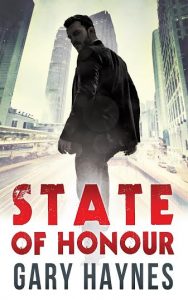NOVELIST GARY HAYNES

Gary Haynes writes terrific thrillers — his past novels include STATE OF HONOUR and STATE OF ATTACK. His upcoming novella is set in part in Berlin during the final days of World War II. I caught up with Gary for this interview.

- I understand that your next thriller is set partially in Berlin in the final days of World War II. Please tell us about the book.
The book is set in two time-frames: 2015 and 1945. The protagonist, Gabriel Hall, is a lawyer in New York. His adopted niece goes missing due to his neglect, and he sets out to find her.
The 1945 chapters begin with the discovery of certain items in a Berlin bunker by a Red Army assault squad. The NKVD investigator assigned to the case, Joseph Kazapov, is also trying to find members of his family.
The chaos of war in 1945 is juxtaposed with the chaos of a single man’s life in 2015. But the past and the present increasingly converge until the final quarter of the book when the mysteries are resolved. It is in essence a book about both revenge and atonement.
- How did you research the Berlin of that period? What are some of your favorite books or other sources about Berlin in the WWII era?
I always try to vary my research methods, which helps to identify any inconsistencies. For the Berlin chapters I read nonfiction history books widely. But for me the seminal book on the last days of Berlin in WW2 is Antony Beevor’s Berlin: the Downfall, 1945. For those that are interested in WW2 history, his book on the Eastern Front, Stalingrad, is a must read. I also read books written at the time, such as Christopher Isherwood’s Goodbye to Berlin.
Apart from this, I watched news and film shot at the time, and studied as many photographs as possible. I also read translations of eye witness accounts, official documents and newspaper reports. I checked specialist dealer sites online for recent photographs of surviving items.
I like to walk the streets of somewhere I’m writing about, even if the writing is historical. The ambiance of a place changes over time, but the essence of it does not.
- What are some of your favorite things to do in Berlin?
On a sunny day the Tiergarten is a delight. If the mood takes me I will spend an evening at the opera, the Deutsche Oper Berlin in the Charlottenburg district, or have a beer at the Zig Zag Jazz Club in the southwest of the city.
I do like to remind myself of the past and it’s impossible not to in a city like Berlin. There is an educative museum, The Topography of Terror, built on the site of the old Gestapo headquarters. I consider it to be the finest of its kind.
The beer in Berlin, like many European capitals, is superb. Berliner Kindl Pils and Erdinger Weissbier Dunkel to name but two. Arguably the bars in the east of the city are more fashionable these days, but I still like the Schöneberg area, and imagine Christopher Isherwood and later, David Bowie, walking about.

(Berlin’s Tiergarten)
- What are some of your favorite things to do in New York City?
I always seem to be in transit when I visit New York. I do love Central Park and it features in my new novel, and the Ground Zero Memorial is very moving.
I can spend hours in the Metropolitan Museum of Art. But for me New York is about its people. Nothing beats eating Thai food in Soho, Manhattan, and watching the world go by.

(The 9/11 Memorial in Lower Manhattan)
- Are there things about WWII-era Berlin that aren’t presently known but which you would like to know?
That’s a difficult question, given the amount of research on the subject and the fact that the Nazis were fastidious record-keepers. These events happened when my parents were children, not so long ago from a historical perspective, and yet to think of Berlin in flames is extraordinary.
I suppose it’s the intangible rather than the tangible things that still aren’t presently known. By that I mean the inner thoughts of the man or woman in the street. What were they thinking after the Battle of Kursk? Did they think as Churchill did that it was the beginning of the end? Did they seriously consider how they would react when the encircling Red Army was a mile from the outskirts of the capital? It is so much more complicated than stating one person experienced only fear while another experienced only a desire to sacrifice their life.
Some leading historians believe that the Holocaust was the result of a progression of thought by the leaders of the Third Reich, rather than a systematic plan from the outset. What is still unknown is the progression of thought of the Berlin butcher, the seamstress, the schoolteacher, especially in the last days of the war. We can imagine these things. We can read letters and listen to tapes of witnesses. But ultimately these are things we will never know.
- Which books have you recently read and especially liked?
I read Richard Flanagan’s novel The Narrow Road To The Deep North after it won the Man Booker Prize. This is a powerful, harrowing and deeply intelligent novel, a non-linear story of love and war written in the third person and with several POVs. The writing is at times poetic, and always incisive. The events depicted on the Line, the construction of the Thai railway by Australian POWs, are graphic and shocking, but the writer handles them with both a clinical detachment and a deep compassion that is very effective. There is a diverse tapestry of characters, both Japanese and Australian, and the narrative follows their lives before, during and after WW2, although it rightly focuses on the main character, Dorrigo Evans, and the horrific events on the Line.
I read All The Light We Cannot See by Anthony Doerr before it won the Pulitzer Prize and thought it was beautifully crafted. It is a celebration of the human spirit, both in terms of overcoming individual ‘disabilities’ and the almost apocalyptic nature of world events at the time. It is also a celebration of language, a wonderful and evocative symphony of language.
I’m a fan of Thomas Harris and read Hannibal earlier in the year. He manages to fuse erudition and horror in an impressive manner. I can honestly say that I consider Dr Hannibal Lecter to be the most intriguing and well-written character in this genre.
